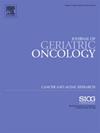澳大利亚医疗保健专业人员对老年癌症患者管理的经验和看法:一项定性研究
IF 3
3区 医学
Q3 GERIATRICS & GERONTOLOGY
引用次数: 0
摘要
在澳大利亚,患有癌症的老年人占癌症诊断的很大比例。多病和与衰老相关的脆弱性使癌症的治疗和管理具有挑战性。有有限的定性研究探索目前的护理实践和使用的老年评估(气体)在澳大利亚。本研究旨在定性地探讨澳大利亚医疗保健专业人员(HCPs)对老年癌症患者的治疗决策经验,以及对GAs在澳大利亚癌症护理中的作用的看法,以确定实施的潜在障碍。材料和方法为老年癌症患者提供护理的澳大利亚HCPs完成了一项简短的在线调查,并参与了一项半结构化的电话访谈,探讨他们对老年癌症患者治疗决策和管理的看法和经验。有目的的抽样确保了跨学科的代表性。采用框架方法进行专题分析,确定关键主题。结果31名HCPs (n = 19名医疗HCPs, n = 7名肿瘤护士,n = 5名专职HCPs)完成了在线问卷。在考虑治疗决策时,大多数参与者认为老年领域的评估是重要的/非常重要的,然而,对评估功能和活动能力的客观测量的感知重要性存在差异。在完成问卷调查的31名参与者中,有29人参加了半结构化的电话采访。访谈的定性分析揭示了四个主要主题:(1)我们认为谁更老?(2)老年人的临床管理-理论与实践,(3)老年评估是否有价值?(4)影响GA实施的因素和一个总体主题(5)老年癌症患者的治疗决策。本研究提供了对目前老年癌症患者护理实践的见解,以及在澳大利亚癌症服务中实施GA的障碍和促进因素。需要进行卫生经济研究,证明气体促进系统级变革的成本效益。还需要对澳大利亚保健医务人员进行关于老年原则和评估的进一步教育和培训,以改善对老年癌症患者的管理。本文章由计算机程序翻译,如有差异,请以英文原文为准。
Australian healthcare professionals' experiences and perception of management of older adults with cancer: A qualitative study
Introduction
Older adults with cancer make up a large proportion of cancer diagnoses in Australia. Multimorbidity and aging-related vulnerabilities can make cancer treatment and management challenging. There are limited qualitative studies exploring current practice of care and use of geriatric assessments (GAs) in Australia. This study aimed to qualitatively explore Australian healthcare professionals' (HCPs) experiences of treatment decision-making in relation to older adults with cancer and perceptions of the role of GAs in cancer care in Australia to identify potential barriers to implementation.
Materials and Methods
Australian HCPs providing care for older adults with cancer completed a short online survey and participated in a semi-structured telephone interview exploring their perceptions and experiences of treatment decision-making, and management of older adults with cancer. Purposive sampling ensured representation across disciplines. Thematic analysis using a framework approach identified key themes.
Results
Thirty-one HCPs (n = 19 medical HCPs, n = 7 cancer nurses, n = 5 allied HCPs) completed the online questionnaire. Most participants rated assessment of geriatric domains to be important/very important when considering treatment decisions, however there was variability in perceived importance for assessing objective measures of function and mobility. Of the 31 participants that completed the questionnaire, 29 participated in a semi-structured telephone interview. Qualitative analysis of interviews revealed four main themes: (1) Who do we consider older? Chronological vs. functional age, (2) Clinical management of older adults – theory vs. practice, (3) Is there value in geriatric assessments? (4) Factors that impact GA implementation, and one overarching theme (5) Treatment decision-making for older adults with cancer.
Discussion
This study provides insight into current practice of care for older adults with cancer and the barriers and facilitators to GA implementation within Australian cancer services. Health economic research demonstrating cost-effectiveness of GAs to facilitate system-level change is required. There is also need for further education and training for Australian HCPs on geriatric principles and assessments to improve management for older adults with cancer.
求助全文
通过发布文献求助,成功后即可免费获取论文全文。
去求助
来源期刊

Journal of geriatric oncology
ONCOLOGY-GERIATRICS & GERONTOLOGY
CiteScore
5.30
自引率
10.00%
发文量
379
审稿时长
80 days
期刊介绍:
The Journal of Geriatric Oncology is an international, multidisciplinary journal which is focused on advancing research in the treatment and survivorship issues of older adults with cancer, as well as literature relevant to education and policy development in geriatric oncology.
The journal welcomes the submission of manuscripts in the following categories:
• Original research articles
• Review articles
• Clinical trials
• Education and training articles
• Short communications
• Perspectives
• Meeting reports
• Letters to the Editor.
 求助内容:
求助内容: 应助结果提醒方式:
应助结果提醒方式:


